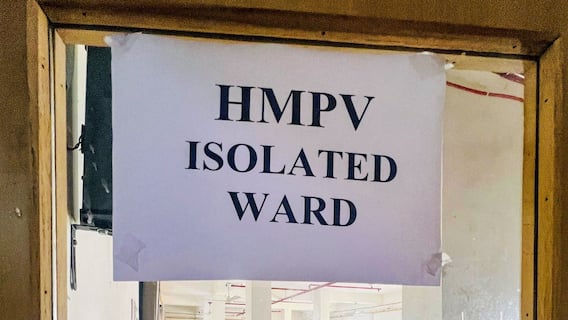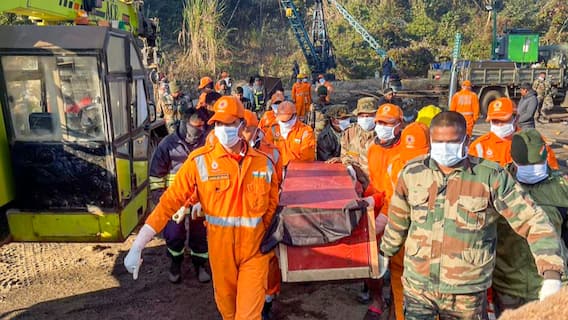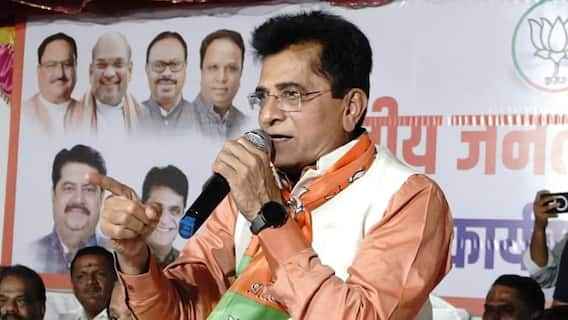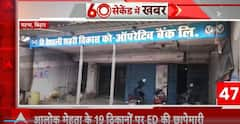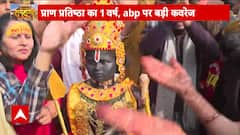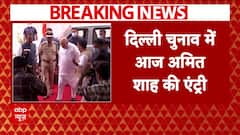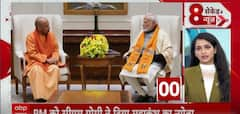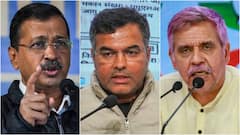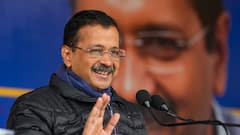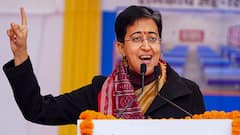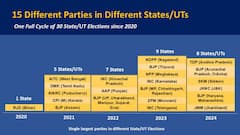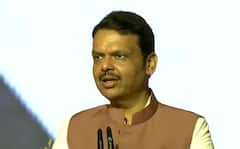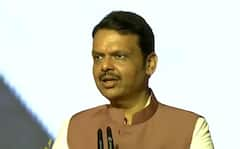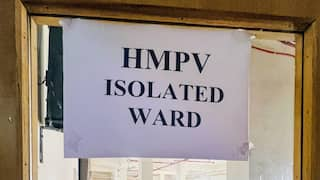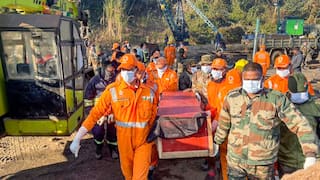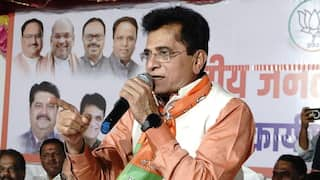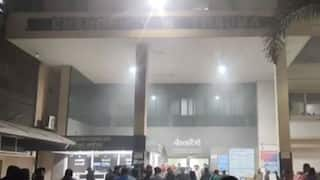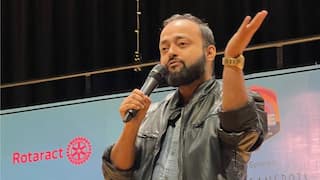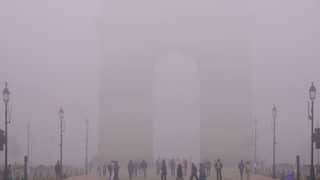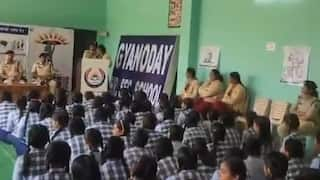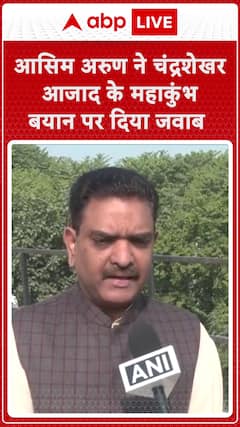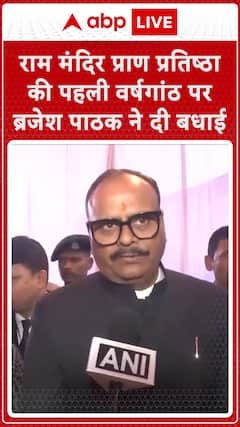Lok Sabha Polls Phase 6: All Eyes On I.N.D.I.A Vs BJP In Delhi As Voting Set To Take Place Across 58 Seats
Lok Sabha Polls Phase 6 covers 58 seats across eight states and UTs. In Delhi, a fierce contest is expected between the AAP-Congress alliance and the BJP in all seven seats.

Lok Sabha Polls Phase 6: The Polling for Phase 6 of the Lok Sabha elections on Saturday will take place in 58 Parliamentary Constituencies (PCs) across eight States and Union Territories (UTs), including Haryana and the National Capital Territory (NCT) of Delhi. Other states and a union territory participating in this phase include Bihar, Jharkhand, Jammu and Kashmir, Odisha, Uttar Pradesh, and West Bengal. Simultaneously, 42 Assembly Constituencies in Odisha will also vote on May 25.
The full list of constituencies that go to poll in Lok Sabha Polls Phase 6 includes:
- Bihar: Valmiki Nagar, Paschim Champaran, Purvi Champaran, Sheohar, Vaishali, Gopalganj, Siwan, Maharajganj
- Delhi: Chandni Chowk, North East Delhi, East Delhi, New Delhi, North West Delhi, West Delhi, South Delhi
- Haryana: Ambala, Kurukshetra, Sirsa, Hisar, Karnal, Sonipat, Rohtak, Bhiwani-Mahendragarh, Gurgaon, Faridabad
- Jammu & Kashmir: Anantnag
- Jharkhand: Giridih, Dhanbad, Ranchi, Jamshedpur
- Odisha: Sambalpur, Keonjhar, Dhenkanal, Cuttack, Puri, Bhubaneswar
- Uttar Pradesh: Sultanpur, Pratapgarh, Phulpur, Allahabad, Ambedkar Nagar, Shrawasti, Domariyaganj, Basti, Sant Kabir Nagar, Lalganj, Azamgarh, Jaunpur, Machhlishahr, Bhadohi
- West Bengal: Tamluk, Kanthi, Ghatal, Jhargram, Medinipur, Purulia, Bankura, Bishnupur
Delhi
Amid the prevailing fierce summer heat, the national capital is set for polling on Saturday following a record two-month-long campaign. The Bharatiya Janata Party (BJP) and the I.N.D.I.A. bloc partners are pitted in a direct, one-on-one contest in all seven Lok Sabha constituencies.
The I.N.D.I.A. bloc, comprising the Aam Aadmi Party (AAP) and the Congress, ]reached a pre-poll understanding for the elections in Delhi. The AAP is contesting four seats, while the Congress has fielded candidates for the remaining three seats. This is the first Lok Sabha election where AAP and Congress have united against the BJP, posing a significant challenge to the party ruling at the Centre.
A total of 1.52 crore voters, including 82 lakh male, 69 lakh female, and 1,228 third-gender voters, are eligible to cast their votes at over 13,000 polling booths across 2,627 locations. Voting will commence at 7 am. The weather department has issued a yellow alert for polling day, with the maximum temperature expected to reach 44 degrees Celsius.
Over 2.52 lakh first-time voters will participate in the elections. The electoral battle in Delhi has seen significant developments, including the BJP dropping six out of its seven sitting MPs and replacing them with fresh candidates. Meanwhile, the AAP faced a setback with the arrest of its national convener and Delhi Chief Minister, Arvind Kejriwal, by the Enforcement Directorate (ED) in a money laundering case shortly after the polls were announced. Kejriwal was granted interim bail by the Supreme Court after 50 days and he re-energised his party with extensive campaigning.
The AAP has fielded Kuldeep Kumar (East Delhi), Mahabal Mishra (West Delhi), Somnath Bharti (New Delhi), and Sahi Ram Pahalwan (South Delhi). The Congress candidates are J P Agarwal (Chandni Chowk), Kanhaiya Kumar (North East Delhi), and Udit Raj (North West Delhi). BJP candidates include Manoj Tiwari (North East Delhi), the only sitting MP retained by the party; Ramvir Singh Bidhuri (South Delhi), Bansuri Swaraj (New Delhi), Harsh Deep Malhotra (East Delhi), Yogendra Chandolia (North West Delhi), Praveen Khandelwal (Chandni Chowk), and Kamaljeet Sehrawat (West Delhi).
The West Delhi constituency, with 25.87 lakh voters, is the largest in the national capital, while New Delhi constituency, with 15.25 lakh voters, is the smallest. North West Delhi is the only reserved seat among the seven.
Several dignitaries, including President of India Droupadi Murmu, Congress leaders Sonia Gandhi and Rahul Gandhi, Delhi Chief Minister Arvind Kejriwal, and Union Minister Hardeep Singh Puri, are also voters in the city.
Uttar Pradesh
The fate of several high-profile candidates, including former Union Minister Maneka Gandhi, will be decided on Saturday as 14 seats in Uttar Pradesh go to polls in the sixth phase of the Lok Sabha elections. The bypoll for the Gaisari assembly seat in Balrampur will also take place on the same day.
Chief Electoral Officer Navdeep Rinwa stated that 162 candidates, including 146 men and 16 women, are vying for the Lok Sabha seats, while seven hopefuls are contesting in Gaisari. Campaigning for this phase ended at 6 pm on Thursday, with voting scheduled from 7 am to 6 pm on Saturday.
In Sultanpur, BJP candidate Maneka Gandhi is seeking her ninth term in the Lok Sabha, facing off against the Samajwadi Party's Ram Bhual Nishad and the Bahujan Samaj Party's (BSP) Uday Raj Verma.
From Allahabad, Neeraj Tripathi, son of former West Bengal Governor Kesari Nath Tripathi, represents the BJP against the Congress' Ujjawal Raman Singh.
Azamgarh will see incumbent MP Dinesh Lal Yadav Nirahua of the BJP trying to retain his seat against the Samajwadi Party's Dharmendra Yadav. Nirahua had previously defeated Yadav in the 2022 bypoll. The seat was previously held by Samajwadi Party chief Akhilesh Yadav in the 2019 elections.
In Jaunpur, former Maharashtra Minister Kripashankar Singh of the BJP will compete against Samajwadi Party candidate Babu Singh Khushwaha and incumbent MP Shyam Singh Yadav of the BSP.
Bhadohi features Lalitesh Pati Tripathi of the Trinamool Congress in the fray, while in Ambedkar Nagar, the BJP's Ritesh Pandey is up against former minister Lalji Verma of the Samajwadi Party.
In Sant Kabir Nagar, the electoral battle involves BJP incumbent Praveen Nishad and the Samajwadi Party's Laxmikant alias Pappu Nishad.
Uttar Pradesh, with 80 seats, sends the highest number of MPs to the Lok Sabha. Voting has already been conducted for 53 seats in the first five phases. The remaining 13 seats will cast their votes in the seventh phase on June 1.
West Bengal
The Jangal Mahal region, comprising five districts, gears up for the sixth phase of polls on Saturday, marking a crucial moment in Bengal's electoral landscape. With eight Lok Sabha seats at stake, the region is a focal point for identity politics and the endurance of political dynasties, promising a gripping showdown between the Trinamool Congress (TMC) and the Bharatiya Janata Party (BJP).
According to an election official, a substantial 1.45 crore voters, inclusive of 73.63 lakh men, 71.70 lakh women, and 133 individuals of the third gender, are set to cast their ballots across 15,600 polling stations, with 2,678 stations designated as critical, PTI reported.
In the 2019 polls, the BJP secured five out of the eight seats, indicating a significant shift in the region's political landscape. However, the TMC remains resilient, particularly in areas such as Ghatal, represented by veteran MP Dev aka Dipak Adhikari.
Purba Medinipur district, home to Tamluk and Kanthi Lok Sabha seats, has witnessed dramatic political transformations, with the Adhikari family's influence at the forefront. The defection of Suvendu Adhikari to BJP in 2021 altered the region's dynamics, despite TMC's efforts to bolster support through welfare initiatives aimed at tribal communities.
Kanthi and Tamluk constituencies epitomise the prevalence of dynasty politics, with Suvendu Adhikari's family wielding considerable influence.
In a notable development, former Calcutta High Court judge Abhijit Gangopadhyay contests on a BJP ticket against TMC's Debangshu Bhattacharya in Tamluk. However, challenges loom for BJP in Jhargram, Purulia, and Medinipur seats, where unrest stemming from demands for Scheduled Tribe status among the Kurmi community complicates the electoral contest.
Despite BJP's past successes in certain assembly segments, TMC's resurgence in the 2021 polls poses a formidable challenge, reflecting a broader trend of political volatility in the region.
Haryana
Polling in the 10 Lok Sabha constituencies of Haryana, along with the Karnal assembly bypoll, is slated for Saturday. A total of 223 candidates, including prominent figures like former Chief Minister Manohar Lal Khattar and Congress stalwart Kumari Selja, are vying for victory, drawing attention from more than 2 crore eligible voters. Chief Minister Nayab Singh Saini's bid in the Karnal by-election intensifies the electoral contest.
The BJP, having swept all 10 Lok Sabha seats in the 2019 general elections, faces a spirited challenge from opposition Congress, setting the stage for an interesting showdown. Notable contests include Karnal, where Khattar confronts Haryana Youth Congress president Divyanshu Budhiraja, and Hisar, witnessing a multi-cornered tussle involving Power Minister Ranjit Singh Chautala and members of the Chautala clan.
OPINION ON ABP LIVE | Ex-CM Khattar Vs Debutant Budhiraja: Will Karnal See A Swing? All Eyes On This Battle Of Panipat
In Kurukshetra, industrialist Naveen Jindal, formerly with Congress, now represents BJP, clashing with AAP's Sushil Gupta and INLD's Abhay Singh Chautala. Union ministers Rao Inderjit Singh and Krishan Pal Gurjar seek re-election from Gurugram and Faridabad seats, respectively, amidst a spirited challenge. Congress leader Raj Babbar enters the fray from Gurugram.
The political battlefield extends to Sirsa, where Congress' Kumari Selja and BJP's Ashok Tanwar lock horns, and Rohtak, witnessing a faceoff between Deepender Singh Hooda and BJP's Arvind Sharma.
Security preparations for the polls include over 35,000 police personnel and 112 paramilitary companies deployed to ensure smooth conduct. Director General of Police Shatrujeet Kapur informed about the deployment of more than 24,000 home guards to bolster security measures, news agency PTI reported.
Chief Electoral Officer Anurag Agarwal detailed the extensive logistical arrangements, including the deployment of over 45,000 EVMs, 24,000 control units, and 26,000 VVPAT machines across 20,000 polling stations. Notably, 99 polling stations will be exclusively operated by women staff, showcasing gender inclusivity in the electoral process.
Jannayak Janta Party (JJP), Indian National Lok Dal (INLD), and Bahujan Samaj Party (BSP) have also fielded candidates.
Jammu And Kashmir
In the Anantnag-Rajouri constituency, PDP chief Mehbooba Mufti is vying for victory and elaborate arrangements have been made to ensure smooth and secure polling.
Contesting against Mufti, who aims to revive her party's fortunes post its alliance with the BJP in 2015, is a field of 18 other candidates, including National Conference's Mian Altaf. The elections are scheduled for Saturday amid heightened security measures and amid the backdrop of recent terror incidents in the region.
Officials have left no stone unturned in securing the area, deploying multi-layered security arrangements across the constituency spread over 18 assembly segments in south Kashmir and Rajouri and Poonch districts. The Election Commission has established 2,338 polling stations to accommodate over 18.36 lakh voters, with stringent measures in place to ensure free and fair polling.
A contingency plan has been devised for the 19 border polling stations along the Line of Control in Rajouri and Poonch, considering the remote possibility of cross-border shelling. Additionally, special arrangements have been made for polling stations in communication-shadow areas, including the provision of satellite phones, wireless sets, and special runners in case of emergencies.
The contentious redrawn parliamentary seat has been a subject of criticism, particularly regarding the delimitation process, with concerns raised over geographical coherence. However, despite the subdued campaigning witnessed in some areas, regions like Poonch and Rajouri have seen vigorous political activities.
Odisha
A total of 447 candidates, including 64 contesting for Lok Sabha seats and 383 for assembly constituencies, are set to compete in the penultimate phase of elections on May 25. Among the prominent candidates are Union Minister Dharmendra Pradhan, vying for the Sambalpur Lok Sabha seat and incumbent Puri MP Sambit Patra seeking re-election.
In the 2019 elections, the Biju Janata Dal (BJD) secured victories in the Lok Sabha seats of Cuttack, Puri, Keonjhar, and Dhenkanal, while the Bharatiya Janata Party (BJP) won the Sambalpur and Bhubaneswar seats.
Chief Electoral Officer N B Dhal announced that a total of 94.48 lakh voters are eligible to cast their votes across 10,581 polling booths. Of these, 2,000 have been identified as critical and another 2,000 as model booths. To ensure security, 121 companies of central forces will be deployed during this phase of the polls.
ALSO READ ON ABP LIVE | ‘Nothing Is Impossible,’ Says Omar Abdullah On Article 370 Restoration — ‘Ready For Long Fight’
Lok Sabha Polls Phase 6: ECI Voters In Delhi, Gurgaon, Faridabad To Break Trend Of Urban Apathy
According to the Election Commission of India (ECI), Chief Electoral Officers and state machineries have been instructed to implement measures to mitigate the adverse impacts of hot weather or rainfall where forecasted. Polling stations are equipped with ample shade, drinking water, ramps, toilets, and other essential facilities to ensure voters have a comfortable and secure environment.
#WATCH | Delhi | Ahead of the sixth phase of Lok Sabha elections on 25th May, Chief Election Commissioner Rajiv Kumar says, "Polling in the sixth phase is spread over 58 PCs and across 8 States/UTs, and 11.13 crore voters. On all polling stations, we have made arrangements for… pic.twitter.com/ewYsLODwq6
— ANI (@ANI) May 24, 2024
The Commission has urged voters to turn out in large numbers and vote with responsibility and pride. In particular, voters in urban centres such as Delhi, Gurgaon, and Faridabad are reminded of their duty to vote and to break the trend of urban apathy.
Voting starts at 7 AM, with varying closure times. Approximately 11.4 lakh polling officials will welcome over 11.13 crore voters across 1.14 lakh polling stations, as per the ECI's statement. The electorate includes 5.84 crore males, 5.29 crore females, and 5,120 third gender electors, the ECI informed.
Notably, there are over 8.93 lakh registered voters aged 85 and above, 23,659 voters above 100 years, and 9.58 lakh Persons with Disabilities (PwD) voters, who have the option to vote from their homes. This home voting facility has received tremendous appreciation and response, as per the poll body.
184 Observers (66 General, 35 Police, 83 Expenditure) have already arrived at their constituencies to maintain vigilance. Special Observers have also been deployed in certain states. Surveillance includes 2,222 Flying Squads, 2,295 Static Surveillance Teams, 819 Video Surveillance Teams, and 569 Video Viewing Teams to handle any form of voter inducement strictly and swiftly.
A total of 257 international border check posts and 927 inter-state border check posts are actively monitoring for any illicit flow of liquor, drugs, cash, and freebies. Strict surveillance is also in place for sea and air routes.
Assured Minimum Facilities like water, shade, toilets, ramps, volunteers, wheelchairs, and electricity are in place to ensure that every voter, including elderly and persons with disabilities, can cast their vote with ease.
The final phase, Phase 7, will occur on June 1 for the remaining 57 seats, with vote counting scheduled for June 4. The first five phases of the General Elections, covering 25 States/UTs and 428 seats, concluded smoothly and peacefully.
Trending News
Top Headlines



